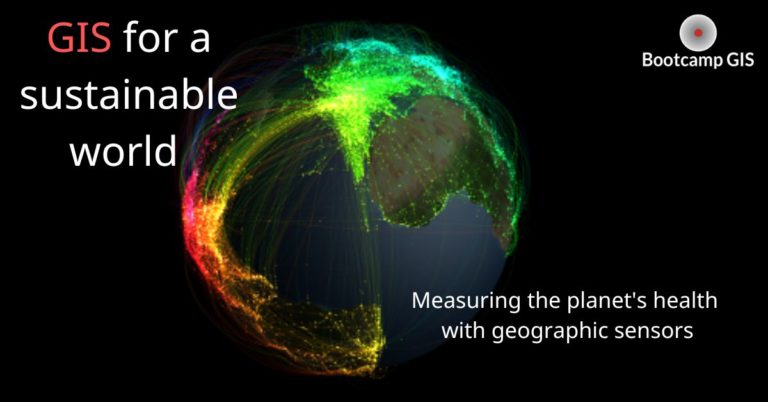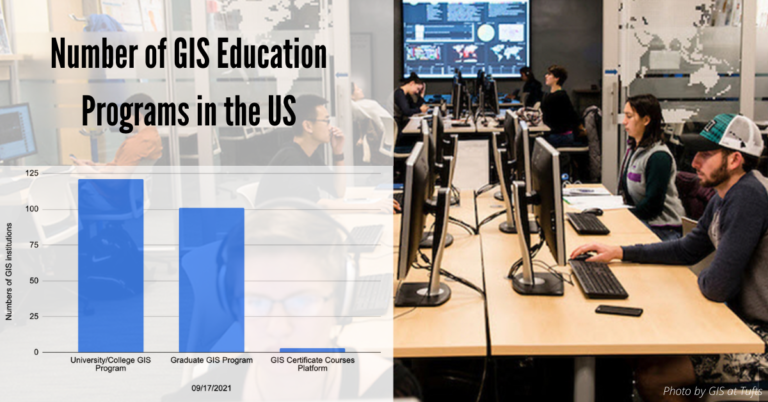
3 helpful tips for changing to a GIS Programs Online Career
Geographic Information Systems (GIS), is a growing industry that was valued at $8.1 Billion in 2020 and expected to grow to $17.5B in the next few years. There are gainful GIS salaries to be had among the common GIS roles that include: GIS analyst, GIS architect, GIS manager, health geographer, climate scientist, and conservationist. People in these careers will often use GIS to emphasize and illustrate problems that are heavily influenced by geography. Senior-level GIS positions will often offer salaries above $80,000. If you’re considering changing course towards a career within this growing field, here are some tips that can help.
1. Earn a GIS Certificate
GIS classes will provide you with the foundational knowledge and general concepts within GIS. There are GIS courses available at a number of universities and community colleges. Certain colleges may offer a GIS certificate but its a good idea to look up top rated GIS certificate programs. Keep in mind though, that only taking one or two GIS classes may not be the most beneficial to your career aspirations.
An excellent option is to enroll in an online GIS bootcamp, which can prepare you for a career in the field and provide you with a GIS certificate in a much shorter time. Having a GIS certificate will both bump your tech skills and improve your chances of being hired in many fields, even outside of GIS.
2. Learn to use GIS Software
When you start looking for GIS courses, you should be looking to build your software skills in: Esri ArcGIS, QGIS, Google Earth Pro, or other popular softwares. Learning to use at least one of these GIS packages will be very beneficial to your portfolio because you can gain a better understanding of the base applications of these software. One approach to learning GIS software is the self-taught route—reading handbooks, watching Youtube video tutorials, or using free tutorials provided by the GIS software companies themselves. Other ways to learn to use GIS software include reading articles, joining social networks, and signing up for virtual conferences.
Another approach, if you want actual guidance and feedback, is by taking an online GIS course taught by an industry professional. Many of these courses are helpful because they provide you with connections to people actually in the GIS industry, and technical experience from the projects you will complete. Bootcamp GIS has numerous courses available that can teach you to use GIS software to address current real-world issues, such as how to leverage GIS for disaster risk reduction. The experience you get from these courses will make the transition to a GIS career much smoother.
3. Get GIS experience
Nowadays, many jobs look for employees with previous experience. For someone switching into a GIS career, this might seem very daunting. But don’t be scared! There are opportunities for you to gain this GIS experience. The major way to gain GIS experience is through a GIS internship, which could really bulk up your resume. These internships allow you to actually apply GIS concepts and software in real-life situations. In addition to real-world experience and learning important skills, there’s a chance for you to gain valuable connections and networks with GIS industry professionals in these internships. Consider looking on job sites (Indeed, Ziprecruiter, etc.) or networking sites like Linkedin for other GIS internship opportunities.
Another one of the valuable things about having a GIS internship under your belt is how it can bulk up both your resume and portfolio for when you’re applying to actual GIS positions. Take note of the job descriptions you’re applying to, and emphasize relevant GIS skills and things you did during your internship when writing your resume.
These are just a few suggestions for anyone looking to switch into a GIS career. Depending on what field you’re coming from, the switch may be a breeze or a little difficult. But always remember—it’s never too late to make the switch, regardless of where you’re starting!







